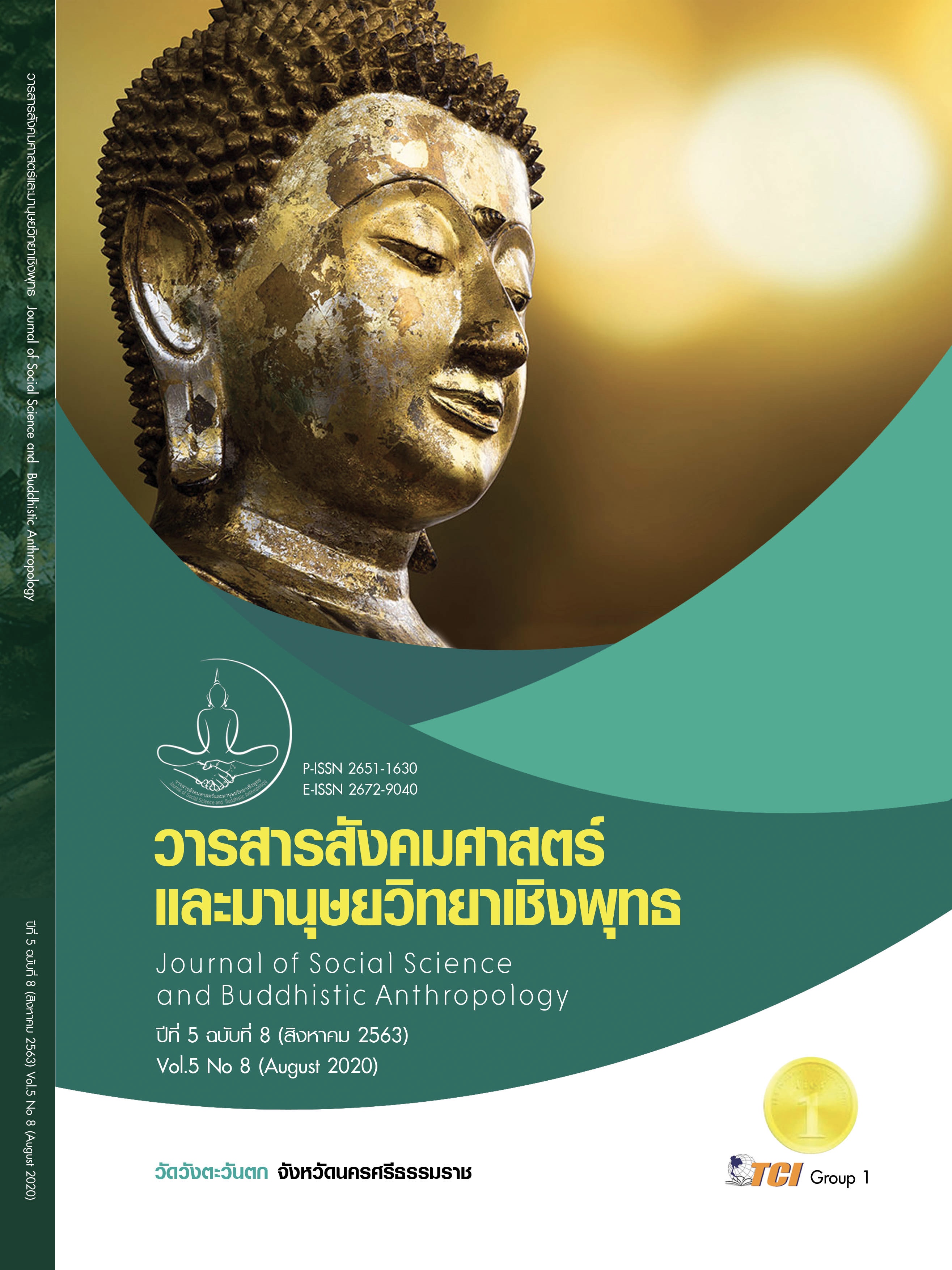COGNITIVE BEHAVIOR MODIFICATION OF CHILDREN AND ADOLESCENTS IN CRIMINAL JUVENILE DELINQUENCY BY BUDDHIST INTELLIGENCE IN YONISOMANASIKARA
Keywords:
Cognitive Behavior Modification, Children and Adolescents, Criminal Juvenile Delinquency, Buddhist Intelligence in YonisomanasikaraAbstract
The objectives of this article are as follows : 1) To study the conditions of criminal juvenile delinquency of children and adolescents ; and theories of cognitive behavior modification by intelligence 2) To study the methods for cognitive behavior modification by Buddhist Intelligence in Yonisomanasikara. 3) To integrate ways of cognitive behavior modification of children and adolescents in criminal juvenile delinquency by Buddhist Intelligence in Yonisomanasikara 4 ) To present knowledge assets Behavior Modification of Children and Adolescents in Criminal Juvenile Delinquency by Buddhist Intelligence in Yonisomanasikara. This research was a qualitative one based documentary research an in-depth interviews, the result of this research shows that 1) the reasons why children and adolescents commit a crime are caused from internal factors such as understanding, values, attitudes or intellectual behaviors which affect external behaviors. 2) Cognitive Behavior Modification by Buddhist Intelligence in Yonisomanasikara is a process of thinking to solve problems consisting of Sammathitthi (right understanding) as a key. This will help children and adolescents live with consciousness (having the presence of mind). 3) the integration of Cognitive Behavior Modification by Buddhist Intelligence in Yonisomanasikara includes the process of practicing thinking to solve problems. This is divided into 4 steps : Step 3.1) Identify problems: to detect the real causes of the problems to make resolutions and prevent them to occur again. Step 3.2) Identify goals/targets of life: to plan to achieve their goals/targets of life. Step 3.3) Implement the plan to achieve the goals/targets of life. Step 3.4) Repeat those steps: to help create positive thinking, to be familiar with this practice, create consciousness and the will to strengthen morality and ethics. Therefore, the skill to solve the problems through Buddhist Intelligence in Yonisomanasikara leads to desirable external behavior and create Buddhist internal intelligence. This is served as an everlasting immunity for children and adolescents to live in the digital era or the twenty-first century with strong hearts and minds.
References
กรมพินิจและคุ้มครองเด็กและเยาวชน. (2562). รายงานสถิติคดีประจำปี 2562. เรียกใช้เมื่อ 9 มิถุนายน 2562 จาก http://www.djop.moj.go.th
กาญจนา คุณารักษ์. (2555). การพัฒนารูปแบบการป้องกันการกระทำผิดซ้ำเกี่ยวกับยาเสพติด : กรณีศึกษาสถานพินิจและคุ้มครองเด็กและเยาวชน. ใน ดุษฎีนิพนธ์ปรัชญาดุษฎีบัณฑิต สาขาวิชาพัฒนาศึกษา. มหาวิทยาลัยศิลปากร.
ฐิติวรรณ สุกใส. (2555). ปัจจัยที่มีอิทธิพลต่อการกระทำผิดซ้ำของเด็กและเยาวชนในสังคมไทย. วารสารดุษฎีบัณฑิตทางสังคมศาสตร์ (ฉบับมนุษยศาสตร์และสังคมศาสตร์), 2(3), 8-19.
ทิพย์สุดา โกยวาณิชย์. (2556). ผลของการปรึกษากลุ่มตามหลักโยนิโสมนสิการ เพื่อพัฒนาพฤติกรรมการบริโภคด้วยปัญญาของวัยรุ่น. วารสารศึกษาศาสตร์ มหาวิทยาลัยบูรพา, 24(2), 47-61.
พระราชบัญญัติศาลเยาวชนและครอบครัวและวิธีพิจารณาคดีเยาวชนและครอบครัว. (2553). ราชกิจจานุเบกษา เล่ม 127 ตอนที่ 72 ก หน้า 12/22 (16 พฤศจิกายน 2553).
วณวรชา พินิจโรคากร และคณะ. (2560). การศึกษาหลักคำสอนในการละการยึดติดวัตถุนิยมเชิงพุทธ. วารสารบัณฑิตศึกษาปริทรรศน์, 13(ฉบับพิเศษ), 237-249.
สมเด็จพระพุทธโฆษาจารย์ (ป.อ.ปยุตฺโต). (2559). พุทธธรรม ฉบับปรับขยาย. กรุงเทพมหานคร: สำนักพิมพ์ผลิธัมม์.
สมโภชน์ เอี่ยมสุภาษิต. (2556). ทฤษฎีและเทคนิคการปรับพฤติกรรม. กรุงเทพมหานคร: สำนักพิมพ์จุฬาลงกรณ์มหาวิทยาลัย.
สุธีรา นิมิตนิวัฒน. (2553). การพัฒนารูปแบบกิจกรรมการศึกษานอกระบบโรงเรียนตามแนวคิดนีฮิวแมนนิสและการเรียนรู้ร่วมกันเพื่อพัฒนาความสามารถในการเผชิญและฟันฝ่าอุุปสรรคของเยาวชนตอนปลาย. ใน ดุษฎีนิพนธ์ครุศาสตรดุษฎีบัณฑิต สาขาการศึกษานอกระบบโรงเรียน. จุฬาลงกรณ์มหาวิทยาลัย.
สุรางค์ โค้วตระกูล. (2553). จิตวิทยาการศึกษา. กรุงเทพมหานคร: สํานักพิมพ์แห่งจุฬาลงกรณ์มหาวิทยาลัย.
เสกสิทธิ์ สวรรณยาธิปัติ. (2554). การกระทำความผิดเกี่ยวกับทรัพย์ ยาเสพติด และชีวิตร่างกาย (คดีร้ายแรง) ของเด็กและเยาวชนในเขตกรุงเทพมหานคร และปริมณฑล: การศึกษาวิจัยโดยใช้ทฤษฎีการควบคุมตนเอง. ใน ดุษฎีนิพนธ์ปรัชญาดุษฎีบัณฑิต สาขาอาชญาวิทยาการบริหารงานยุติธรรมและสังคม. มหาวิทยาลัยมหิดล.
อพัชชา ศิริชัย. (2554). ปัจจัยที่ส่งผลต่อพฤติกรรมการกระทำผิดซ้ำของเด็กและเยาวชน ศูนย์ฝึกและอบรมเด็กและเยาวชน กรมพินิจและคุ้มครองเด็กและเยาวชน. ใน วิทยานิพนธ์ศิลปศาสตรมหาบัณฑิต สาขาสังคมวิทยาประยุกต์. มหาวิทยาลัยเกษตรศาสตร์.
Leslie A. H. (1983). Human Brain & Human Learning. New York: Longman.









